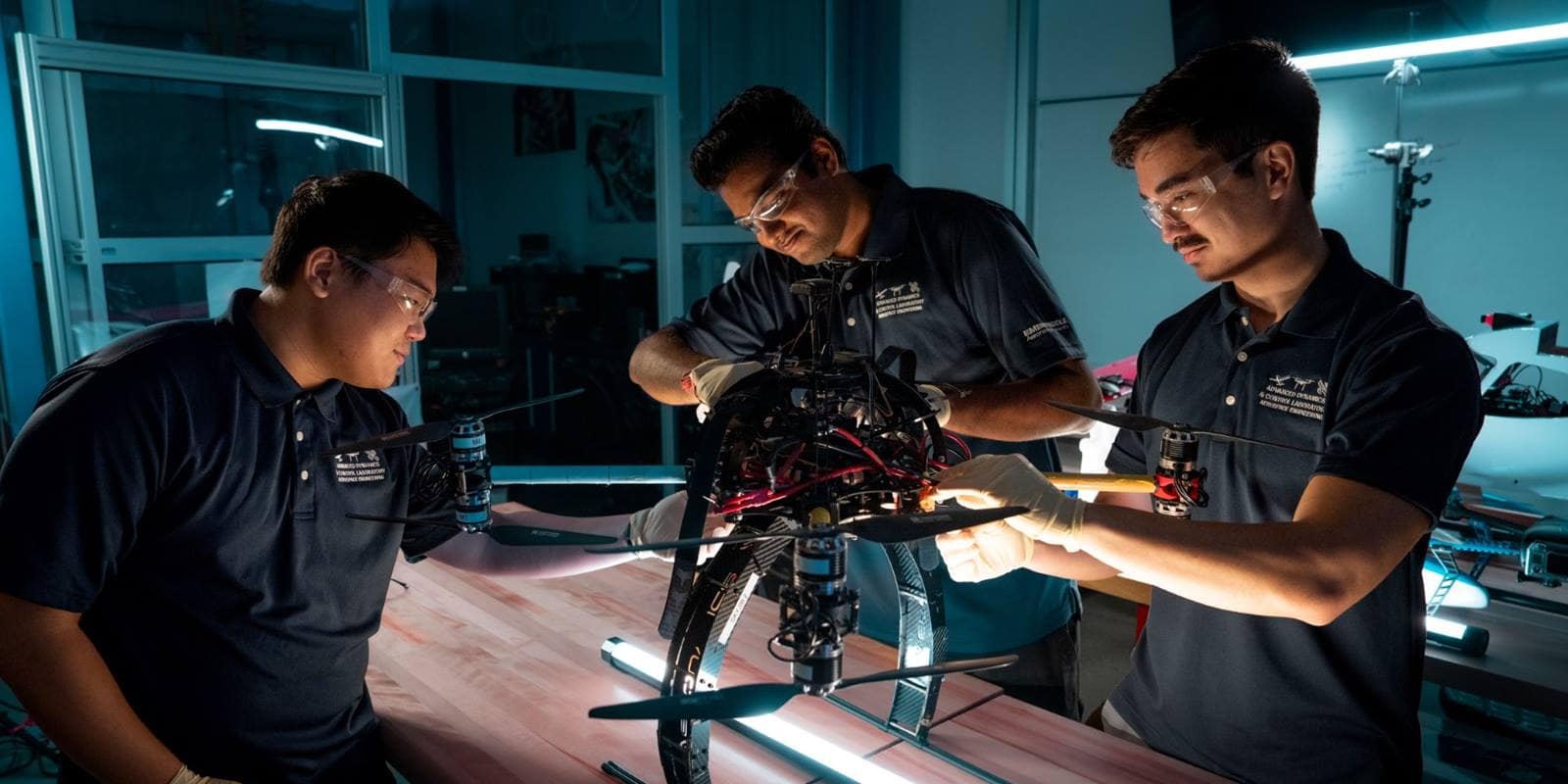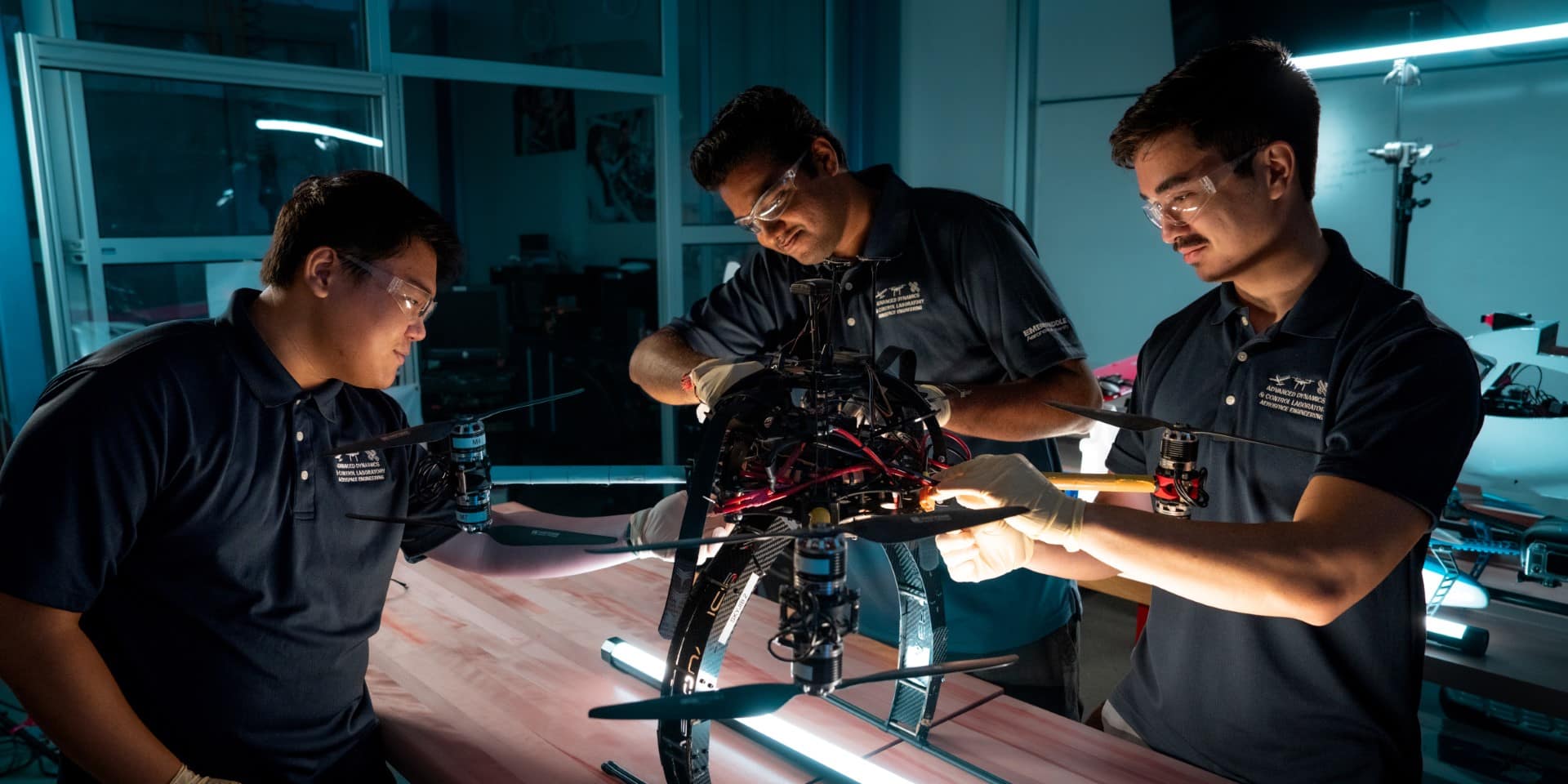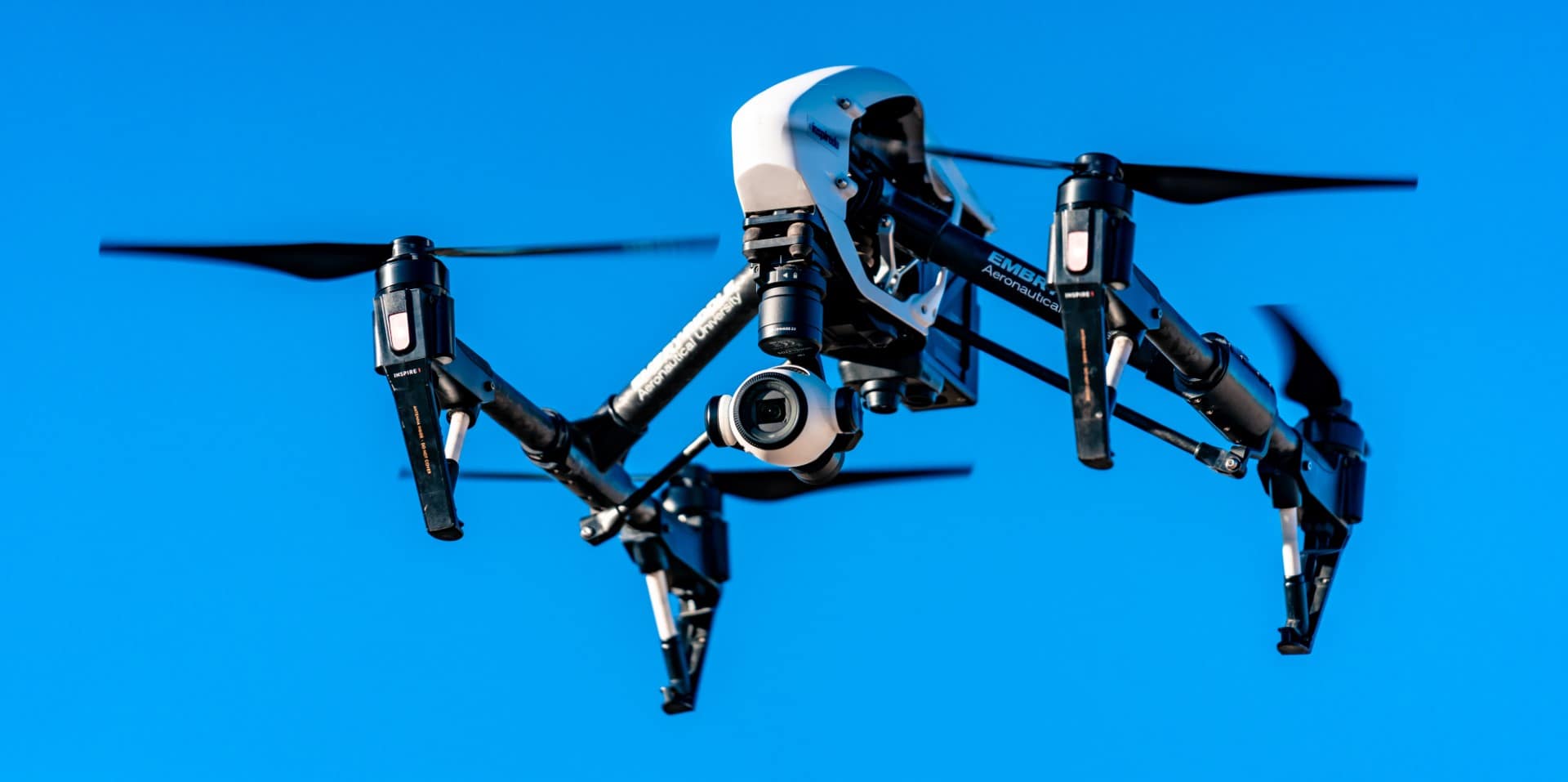
Master of Science in
Uncrewed and Autonomous Systems
The Master of Science in Uncrewed and Autonomous Systems focuses on the industry of uncrewed systems through topics including policy, design and systems management.
About the Master of Science in Uncrewed and Autonomous Systems
Designed to meet a growing demand for uncrewed systems technology professionals, Embry-Riddle’s Master of Science in Uncrewed and Autonomous Systems prepares graduates to continue the path of innovative technological advancement by addressing topics including policy, design, ethics, technology and systems management
Embry-Riddle has been a pioneering institution in both drones and autonomous robotics, and our UAS (Uncrewed Aircraft Systems) master's degree provides uncrewed systems students with unparalleled access to connect with industry professionals, form strong foundational expertise in the field of uncrewed aircraft systems, refine their critical thinking and marketable skills and have opportunities to work with innovative technology and facilities.
Student Learning Outcomes
The Uncrewed and Autonomous Systems master's degree provides a unique learning opportunity that covers uncrewed systems technology such as:
- Advanced Air Mobility and Airspace Integration
- Cybersecurity Vulnerability and Protection
- Interoperability and Autonomous Robotics
- Remotely Sensed Data Capture and Processing
- Scalable Autonomy and Delegated Control Authority
Uncrewed and Autonomous Systems Career Opportunities
Careers and Employers
Master’s degree holders can work in several industries; including but not limited to the military, government, energy and transportation. Embry-Riddle's Worldwide campus educates graduates for careers utilizing drones and completing vital research in environments that humans cannot reach, like deep sea or space, with a placement rate of 100%.
Uncrewed and Autonomous Systems Salary Information
Embry-Riddle master’s degree graduates have many opportunities to heighten their career, with Worldwide alumni salaries averaging $94,000 annually as of 2021.
DETAILS
About Uncrewed and Autonomous Systems at the Worldwide & Online Campus
Embry-Riddle has been a pioneering institution in uncrewed aircraft systems and autonomous robotics education. Uncrewed and Autonomous Systems master's degree students also have access to state-of-the-art instructional technology, such as the Hub and its uncrewed aircraft systems design and testing lab.
The Master of Science in Uncrewed and Autonomous Systems degree program at ERAU’s Worldwide & Online Campus is a degree that aims to develop student expertise in the field of uncrewed systems technology. Students will gain knowledge on the usage of drones along a spectrum of autonomy levels — from remote-controlled to fully autonomous.
Tracks/Specialties and/or Certificates
Students can customize the program to fit their desired career path by selecting specialized focuses on various aspects of uncrewed aircraft systems.
- May choose from three specializations: Small Uncrewed Aircraft Systems (sUAS), Research or Technical Development and Support
- Must obtain a Federal Aviation Administration (FAA) Part 107
- Residency Program UNSY 520— an elite program to train professional drone pilots to the highest industry standards on Earth.
- The program schedules the residency over a weekend, twice each year – once in December and once in May – travel is required as it is hosted in Daytona Beach, Florida, at the Worldwide Headquarters.
- Pursue a Trusted Operator Program® certification from the Association of Uncrewed Vehicle Systems International.
- Agricultural Drone Certification (Part 137)
Uncrewed and Autonomous Systems Information
The Master of Science in Uncrewed and Autonomous Systems provides students with a comprehensive understanding of uncrewed systems.
- Credits: 30
- Online: EagleVision Virtual Classroom
Helpful Links
- View our Online Education options
- Discover the Department Faculty
- Explore the Fields of Study: Aviation & Space
- Find Related Clubs & Organizations
Student Learning Outcomes
Students will:
- Discuss the origination of system capabilities, processes, and technology.
- Examine the effects of the legal and regulatory process on industry practices.
- Investigate uncrewed systems platform and payload selection based on mission oriented goals.
- Explain factors influencing the adoption and use of associated system technologies, in relation to past, present, and emerging perspectives.
- Analyze data through the use of appropriate methods supporting application and operations.
- Investigate how related technologies could affect future markets.
DEGREE REQUIREMENTS
Core/Major
| UNSY 501 | Application of Uncrewed and Autonomous Systems | 3 |
| UNSY 502 | Current Issues in Uncrewed and Autonomous Systems | 3 |
| UNSY 503 | Legal and Regulatory Issues in Uncrewed and Autonomous Systems | 3 |
| UNSY 603 | Uncrewed and Autonomous Systems Operational Configuration | 3 |
| UNSY 606 | Uncrewed and Autonomous Systems Interoperability and Control | 3 |
| MACY 517 | Uncrewed and Autonomous Systems Cybersecurity | 3 |
| Total Credits | 18 | |
| Specialization | 12 | |
| Select one specialization from the following list (includes 4 specific courses per): | ||
| Total Degree Requirements | 30 | |
Specializations
| Small Uncrewed Aircraft System (sUAS) Operations | ||
| Students declaring the sUAS Operations Specialization or registering for courses within it must be physically located within the U.S. when registering for and while participating in the UNSY 520 and UNSY 620 courses. Students must contact their Academic Advisor regarding additional cost, possible travel, and FAA Testing, prior to enrolling in the first course of this specialization, UNSY 515. | ||
| UNSY 515 | sUAS Operation Fundamentals | 3 |
| UNSY 520 | sUAS Practical Application and Assessment | 3 |
| UNSY 620 | sUAS Operational Planning and Safety Management | 3 |
| UNSY 625 | sUAS Advanced Fixed-Wing Operations | 3 |
| Technical Development and Support | ||
| SYSE 500 | Fundamentals of Systems Engineering | 3 |
| SYSE 530 | System Requirements Analysis and Modeling | 3 |
| UASE 531 | Robotics and Control | 3 |
| UNSY 635 | Remote Sensing Data Analysis | 3 |
| Research | ||
| RSCH 665 | Statistical Analysis | 3 |
| RSCH 670 | Research Methods | 3 |
| RSCH 700A | Thesis I | 3 |
| RSCH 700B | Thesis II | 3 |
Get Started Now:
Summary
30 Credits
Estimate your tuition by using the Tuition Calculator
View Financial Aid Information
Learn more about the benefits of an Online Degree
Learn about our General Education
Find out about transferring credits to this degree
Learn more about our Veterans & Military benefits
View our Academic Calendar
Search Courses for this degree


